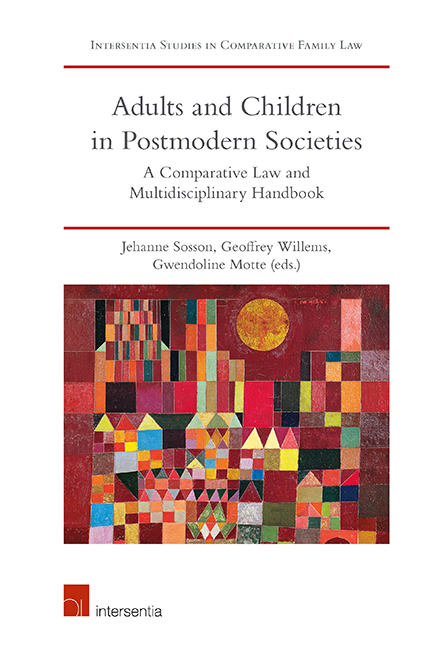Book contents
- Frontmatter
- Contents
- List of Cases
- List of Contributors
- Introduction
- PART I NATIONAL REPORTS ON LEGAL REGULATIONS OF RELATIONSHIPS BETWEEN ADULTS AND CHILDREN
- PART II INTERDISCIPLINARY APPROACH
- PART III INTERNATIONAL LAW INSIGHTS
- PART IV COMPARATIVE APPROACH
- General Conclusion: The Challenge of Transparent and Inclusive Parenthood/Parentality in a Pluralist and Cosmopolitan Context
- About the Editors
Introduction
Published online by Cambridge University Press: 26 June 2019
- Frontmatter
- Contents
- List of Cases
- List of Contributors
- Introduction
- PART I NATIONAL REPORTS ON LEGAL REGULATIONS OF RELATIONSHIPS BETWEEN ADULTS AND CHILDREN
- PART II INTERDISCIPLINARY APPROACH
- PART III INTERNATIONAL LAW INSIGHTS
- PART IV COMPARATIVE APPROACH
- General Conclusion: The Challenge of Transparent and Inclusive Parenthood/Parentality in a Pluralist and Cosmopolitan Context
- About the Editors
Summary
THE RESEARCH CONTEXT, OBJECTIVES AND METHODOLOGY
It has become a commonplace to highlight the important changes that have affected family life since the 1960s. In recent decades, the traditional marriage-based family model has given way to new protean and polymorphic family configurations arising from the precariousness of couples ‘relationships, the rapid development of assisted reproductive technologies (ART) and the rising concern for the recognition and protection of homosexual couples and same-sex parent families.
Such diversification of family patterns represents a formidable challenge for family law as it calls into question our way of understanding and regulating family behaviours. Recently, major international comparative law projects such as The Future of Registered Partnerships have been undertaken in relation to how the law deals with contemporary couples ‘relationships. This research is in line with these initiatives, but focuses on the complexity and multiplicity of relationships between adults and children.
In our postmodern societies, children are sometimes in the centre of a complex network of links with several adults of both sexes (donor, surrogate, intended parents, biological parents, step-parents, foster-parents) and the law is not always clear regarding how, in such intricate configurations, to recognise, protect and promote valuable relationships. Given the scale of the changes, it is likely that the traditional concepts underlying legal parenthood and/or parental responsibility must be re-evaluated and, perhaps, reconstructed.
There appears to be a wide range of national approaches to this legal challenge. Some countries remain strongly attached to classical patterns while others have embarked upon more adventurous reforms. In such a context, it is obvious that there is a great deal to learn from an in-depth comparative exercise.
Based on these considerations, in 2016, the Family Law Centre of the Université catholique de Louvain (UCLouvain) launched a research project, sponsored by the Louvain 2020 strategic project of the UCLouvain, with a twofold objective.
It aims to give a clear, concise and up-to-date account of the current legal regulations of relationships between adults and children in a wide range of selected countries from all over the world.
It also aims to contribute to the current debates on the future of such regulations by proposing useful models for possible developments and accordingly providing valuable outcomes for family law researchers and national and international family lawmakers.
- Type
- Chapter
- Information
- Adults and Children in Postmodern SocietiesA Comparative Law and Multidisciplinary Handbook, pp. 1 - 4Publisher: IntersentiaPrint publication year: 2019

